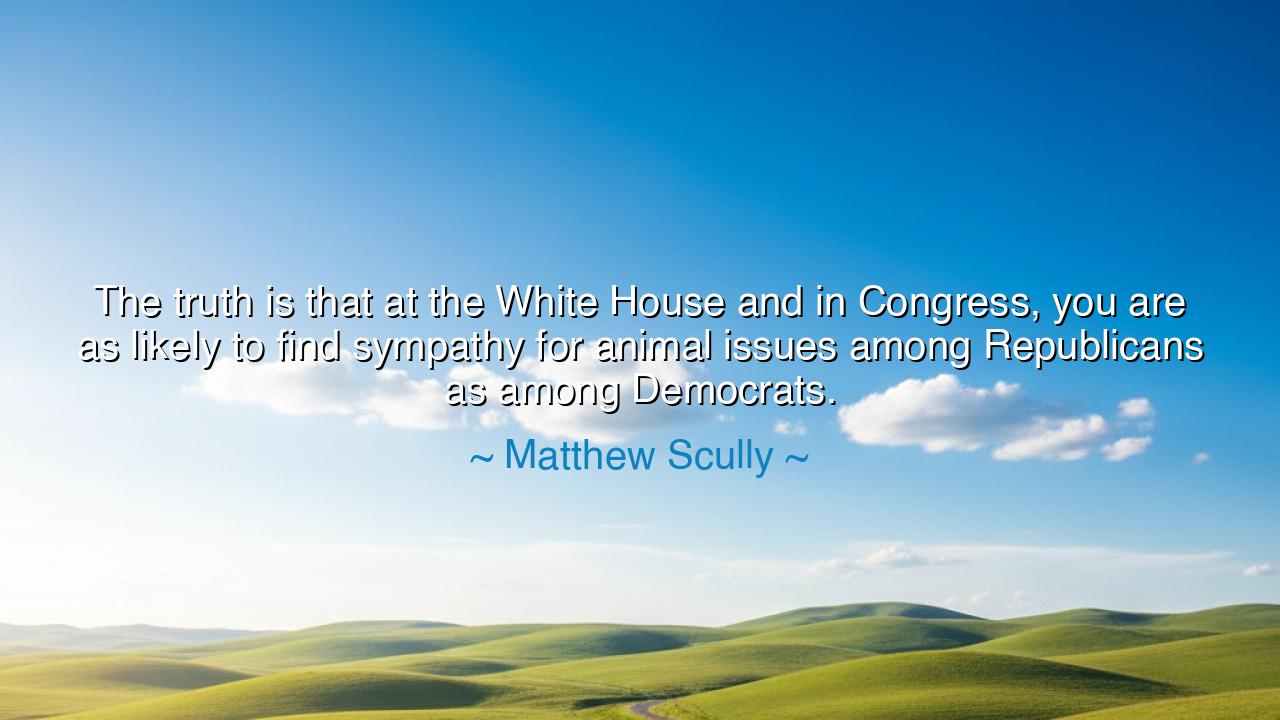
The truth is that at the White House and in Congress, you are as
The truth is that at the White House and in Congress, you are as likely to find sympathy for animal issues among Republicans as among Democrats.






When Matthew Scully declared, “The truth is that at the White House and in Congress, you are as likely to find sympathy for animal issues among Republicans as among Democrats,” he unveiled a truth often lost amid the noise of partisanship: that the care for the weak and voiceless transcends ideology. His words remind us that compassion for animals, those silent companions of humanity, cannot be confined to the banners of party or the rhetoric of politics. For when the suffering of a creature is laid bare, it appeals not to ideology but to the universal heart of mercy within all people.
The origin of this wisdom lies in the nature of moral causes. Many battles in politics are drawn along lines of power, wealth, and doctrine. But the cause of animal welfare is different, for the creatures themselves carry no banner, make no laws, seek no vote. Their vulnerability disarms division. Across time and nations, defenders of animals have risen from unexpected quarters—aristocrats and laborers, believers and skeptics, liberals and conservatives alike. Scully, himself a Republican speechwriter and a man of faith, bore witness to this truth from within the very halls of power, where he saw that sympathy is not chained to one side, but scattered like seed across the field of humanity.
History offers us countless examples. Consider William Wilberforce, a devout Christian and conservative member of Britain’s Parliament in the 18th century. While he is remembered for his crusade against slavery, he also championed the cause of animals, helping to found the Royal Society for the Prevention of Cruelty to Animals. His concern was not born of politics but of conscience, the conviction that cruelty—whether against man or beast—was unworthy of human dignity. Centuries later, this same spirit is found in figures of all political stripes, proving that compassion need not wear a party’s colors.
The meaning of Scully’s words is also a rebuke to the cynicism of our age. Too often we are told that politics is nothing but division, that one side holds all virtue and the other all vice. But here is a cause that pierces through the armor of faction. For when a horse is beaten, or a dog is abandoned, or a whale is hunted to near extinction, the heart stirred to mercy is not the heart of a Republican or a Democrat—it is the heart of a human being. Thus, Scully reminds us that some truths lie deeper than politics, waiting to unite us if we are humble enough to see them.
The lesson is clear: do not let the labels of party blind you to the common ground of compassion. Recognize that in every person, no matter their creed or faction, there lies the potential for kindness. If even in the halls of Congress—so often filled with rancor—men and women of opposing sides can join in sympathy for animals, then surely in our daily lives we too can seek unity through shared mercy. Compassion is the great equalizer, dissolving divisions when hearts open to the suffering of the vulnerable.
What, then, should you do? First, look for the common cause in unexpected places, remembering that kindness is not the property of one group but the heritage of all humanity. Second, act for the sake of those who cannot act for themselves—whether animals, children, or the powerless—knowing that mercy shown to the least among us is mercy shown to all. Third, resist the temptation to sneer at compassion when it comes from your opponents; embrace it, nurture it, and let it be the seed of unity.
Thus, let Scully’s words endure: “You are as likely to find sympathy among Republicans as among Democrats.” The wisdom here is not about politics, but about the universality of compassion. For in the end, the suffering of the innocent does not ask which party you belong to, nor does mercy pause to ask how you vote. Let us remember this truth and live by it, that we may find in our shared sympathy a path toward a gentler world.






AAdministratorAdministrator
Welcome, honored guests. Please leave a comment, we will respond soon